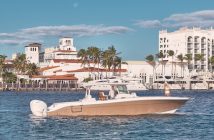Lying just a few kilometres off mainland Mozambique, Benguerra Island spans 6 km by 11 km, and is mostly undeveloped. Only two small resorts exist here, around which acres of unspoilt nature and stunning beaches abound. There are no roads, only sand tracks, and arrival is via helicopter from Vilanculos, which itself is only a two-hour-flight from Johannesburg. As we glide over the ocean, I have to pinch myself, such is the beauty of the scene. Tiny sandbanks, spits of land and a couple of wooden dhows lie below us amid vast swathes of aquamarine. No camera can do it justice.
Azura Benguerra opened in 2007, on the site of Gabriel’s old backpacker hostel, and was built with the help of the local community (population 1,537). Its ethos of sustainable tourism made it the first eco-friendly resort in Mozambique, and through its registered charity, the Rainbow Fund, it continues to support a range of environmental and social initiatives on the island. Over 70% of the staff come from Benguerra, and they’re what really makes this place special.
After 10 minutes, we land on a small helipad, just behind reception, and are met with cocktails, ice-cold flannels and jasmine flowers. Eighteen luxury villas discreetly line the beach, amid trees, indigenous plants and aloes. Behind those, paths made of crushed shells link up the buildings. All the villas were handbuilt by the islanders, using local materials and labour, and much of the traditional artwork and furnishings were created locally or bought from a Fairtrade shop in Vilanculos.

My room – an Infinity Beach Villa – has a thatched jekka roof, its own plunge pool and a sun deck with daybed (perfect for those inevitable afternoon siestas). It’s mere steps away from the ocean, and the little garden is a birdwatcher’s paradise. I spot many native species – dark-capped bulbuls, little egrets, mangrove kingfishers – all of whom join me for breakfast, chattering in the trees, and taking a daily dip in my pool.
Inside my villa is a super-comfy double bed, a writing desk and huge open-plan bathroom. The decor is a blend of natural materials and coastal colours – wooden floors and beams, white walls and Egyptian-cotton bed linen, Mozambican cushions and locally carved wooden bed heads and door frames. But perhaps my favourite details are the complimentary yoga mats and hand weights (which I use in the garden – far better than any gym), and the his-and-hers solar-powered outdoor showers. I’m now a complete fan of al fresco bathing, though the latter might not go down so well back in London.

The main lodge houses a living room with plump sofas and coffee-table books, as well as a library, thatched “Star Bar” and beach-side “Jellyfish” restaurant, where the menu is chalked up each day on a blackboard. Only this area has wifi – there’s no connection in the villas, though I see that as a positive rather than a negative. We’re here to switch off, after all. Even though the place is almost full, we rarely see the other guests. It’s incredibly relaxing and peaceful.
Couples will love it, and families should book into the fabulous three-bedroom Presidential Villa at the back of the property. There’s also a small spa, where I have an incredible oil massage from a lady called Linda. A new, larger spa is set to open this August, alongside two new Royal Beach Villas, which will be the largest and most luxurious of the collection.
Our first night coincides with the weekly concert from the local children’s band. Through the Rainbow Fund, Azura built a primary school nearby – the island’s first. When the resort first opened, only 40 children were in education. Now there are 339. They walk for up to 30 minutes to school each day, and every Saturday come at 6.30am to clean and tidy the building and plant trees. The band is a mixture of some of these children, plus others from three nearby villages. It’s led by the Rainbow Fund’s manager Faizel Kara, and one of the older boys, Mr Jackson. It’s a spirited and heart-warming performance, after which we all join them on the dance floor for a boogie.

The following day, a local man named Carlos takes us out by jeep to explore the island. As it’s a Sunday, the school is empty. However, the small church – a simple thatched building with a sand floor – is full of life. Mozambique has four main religions – Roman Catholic, Christian, Muslim and Protestant. At this particular church, it seems only the women are in attendance. We tiptoe inside just in time to hear them burst into song, with their babies strapped to their backs, and the vicar, wearing a baggy suit, say a few sombre words in a language I don’t recognise.
Although Portuguese is the official language of Mozambique, many people are multilingual. “Myself, I’m feeling like I’m speaking about three and a half languages,” says Carlos as we leave. “Portuguese, Tsonga, Makhuwa and a bit of English. I’m still practicing the English.” He’s proud of his island, loves taking the guests around, and has worked with Azura since the beginning. “We like having the tourists come. They bring us work and help us protect our island.”
As well as the primary school and teachers’ accommodation, the Rainbow Fund is also raising money to build a health clinic. Guests can donate directly to the fund, or bring much-needed educational or medical supplies from home through Pack for a Purpose. Items that are particularly needed are colouring books, pens and second-hand clothes and sunglasses.

There are many activities available at Azura, should the relaxation prove too much. There’s diving (the resort is a registered five-star PADI centre), horse-riding along the beach, fishing and sunset dhow cruises. However, one that I really recommend is the island-hop experience.
The following day, Carlos takes us out by boat to a nearby reef, which forms part of the archipelago’s protected marine park. We spend a blissful hour snorkelling among a kaleidoscopic array of fishes and coral, before being whisked off to Pansy Island – so-called because of the pansy-shaped shells found on the shore. Then we zoom off again to an idyllic beach spot for a fabulous picnic lunch of chilled rosé, fresh fish and a tropical fruit platter, set beneath a tented canopy wrapped in flowers and palm fronds. It’s a scene straight out of Lawrence of Arabia, or perhaps James Bond, should he have some downtime.
Our last night is spent stargazing on the beach. Faizel points out the different stars and planets visible from the resort – Saturn, Sirius, Scorpio, hundreds of stars and comets. The night sky is brimming with life, and it’s amazing what you can see when someone shows you what’s what. It’s the kind of evening all the best trips are made of, and the kind of memories you’ll dine out on for the rest of your life.
Azura Benguerra, from $655 per person per night sharing an entry-level beach villa, excluding flights. For more information, visit www.azura-retreats.com. Katie connected from Johannesburg to Vilanculos with Fly Airlink. For more information, visit www.flyairlink.com.




